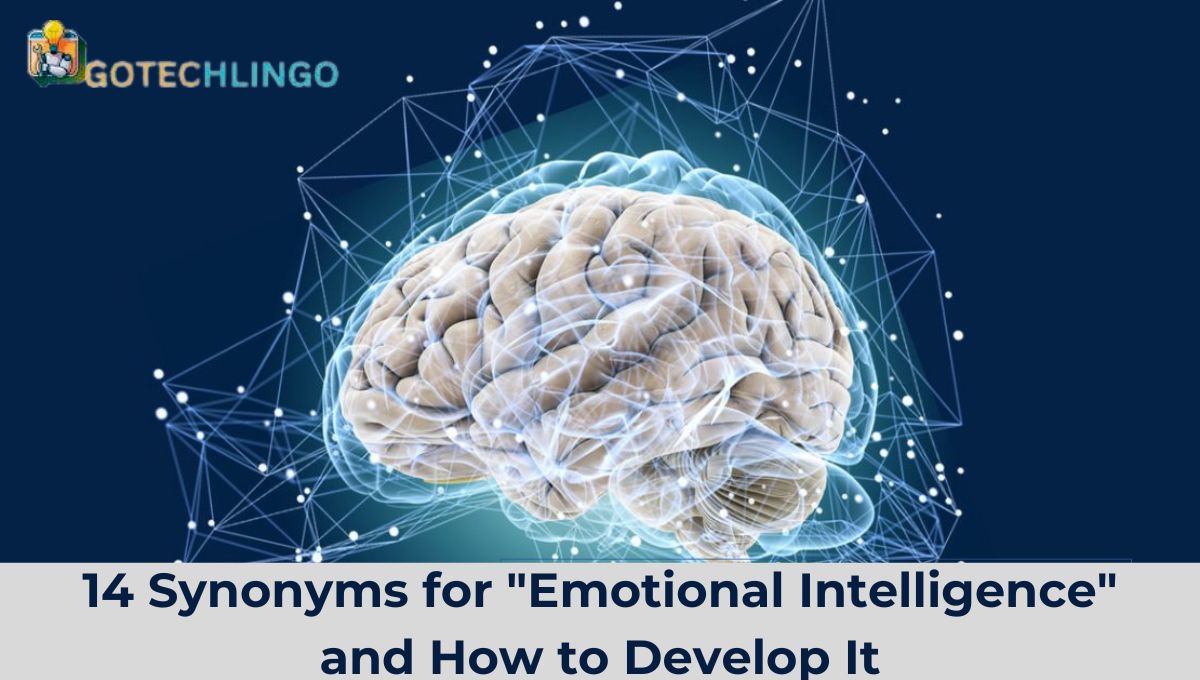Synonyms for Emotional Intelligence
While emotional intelligence is the most common term, several other synonyms exist that refer essentially to the same conceptual understanding and skillset.
| Number | Synonym | Definition | Skill Developed |
| 1 | Cognitive Empathy | The ability to take the perspective of and understand the feelings of others. | Social Awareness |
| 2 | Social Acumen | Street smarts for social situations and interpersonal dynamics. Understanding people and social norms. | Social Awareness |
| 3 | Empathetic Understanding | The capacity for participatory feeling and emotion—projecting one’s personality into another human object that is not oneself in order to understand the other’s feelings, thoughts, and experiences. | Social Awareness |
| 4 | Relational Intelligence | Skills for building and maintaining healthy relationships through effective communication and emotional management. | Relationship Management |
| 5 | Emotional Quotient | Commonly abbreviated as EQ, this refers specifically to emotional intelligence as measured through psychometric tests. | Self-Awareness |
| 6 | People Skills | An umbrella term for interpersonal abilities like rapport building, conflict resolution, persuasion, and empathy. | Relationship Management |
| 7 | Social Intelligence | The ability to navigate complex social relationships and interactions through awareness of social norms, dynamics, and unspoken rules. | Social Awareness |
| 8 | Empathic Intelligence | The aptitude to perceive, understand, and vicariously experience other people’s feelings, motivations, and perspectives. | Social Awareness |
| 9 | Relationship IQ | Capacity for emotionally intelligent relational skills and strong social functioning in various interpersonal contexts. | Relationship Management |
| 10 | Emotional Competence | Mastery of perceiving, using, understanding, and managing emotions in ways that benefit oneself and relationships with others. | Self-Management |
| 11 | Sensory Perception | Awareness, understanding, and empathy derived through nonverbal cues, body language, and other sensory signals from oneself and others. | Social Awareness |
| 12 | Social Cognition | Mental processes that underlie social interactions like interpreting others’ thoughts, feelings, intentions, and behaviors. | Social Awareness |
| 13 | Emotional Attunement | Tuning into and appropriately responding to emotional currents, needs, and communication in relationships. Being on the same wavelength emotionally. | Social Awareness |
| 14 | Personal Insight | Gaining awareness of your own thoughts, emotions, and behaviors in various situations. Self-awareness is key to recognizing how you feel and why you react in certain ways. | Self-Awareness |
Why Emotional Intelligence Matters
Emotional intelligence, also known as emotional quotient or EQ, refers to the ability to understand, use, and manage emotions in a healthy way. It plays a key role in relationships, leadership, and overall success. Research shows those with strong EQ make better leaders, enjoy greater well-being, and have stronger interpersonal skills.
The Importance of Emotional Intelligence (EQ)
Emotional intelligence is the ability to understand, use and manage emotions. Famous researcher Daniel Goleman argues EQ is more important than IQ or technical skills for star job performance. His research found EQ is the biggest predictor of success across different career fields. Those with well-developed EQ have greater self-awareness, can motivate themselves, regulate emotions, and handle relationships in a healthier manner.
Cognitive Empathy
The ability to take the perspective of and understand the feelings of others.
Social Acumen
Street smarts for social situations and interpersonal dynamics. Understanding people and social norms.
Empathetic Understanding
The capacity for participatory feeling and emotion—projecting one’s personality into another human object that is not oneself in order to understand the other’s feelings, thoughts, and experiences.
Relational Intelligence
Skills for building and maintaining healthy relationships through effective communication and emotional management.
Emotional Quotient
Commonly abbreviated as EQ, this refers specifically to emotional intelligence as measured through psychometric tests.
People Skills
An umbrella term for interpersonal abilities like rapport building, conflict resolution, persuasion, and empathy.
Social Intelligence
The ability to navigate complex social relationships and interactions through awareness of social norms, dynamics, and unspoken rules.
Empathic Intelligence
The aptitude to perceive, understand, and vicariously experience other people’s feelings, motivations, and perspectives.
Relationship IQ
Capacity for emotionally intelligent relational skills and strong social functioning in various interpersonal contexts.
Emotional Competence
Mastery of perceiving, using, understanding, and managing emotions in ways that benefit oneself and relationships with others.
Sensory Perception
Awareness, understanding, and empathy derived through nonverbal cues, body language, and other sensory signals from oneself and others.
Social Cognition
Mental processes that underlie social interactions like interpreting others’ thoughts, feelings, intentions, and behaviors.
Emotional Attunement
Tuning into and appropriately responding to emotional currents, needs, and communication in relationships. Being on the same wavelength emotionally.
How to Cultivate Emotional Intelligence

Developing strong emotional intelligence takes ongoing effort. Here are some core practices:
Self-Awareness
Monitor and understand your own emotions, thought patterns, stressors, values, and tendencies. Notice bodily sensations that indicate certain feelings. Reflect deeply through journaling.
Self-Management
Regulate difficult emotions through relaxation, reframing thoughts, or distancing yourself from triggers when upset. Maintain composure under pressure. Seek balance in how you spend your time and energy.
Social Awareness
Pay attention to social and emotional cues from others through listening empathetically and observing body language and tone of voice. Consider different perspectives sensitively without judgement.
Relationship Management
Communicate openly and effectively, resolve conflicts respectfully, inspire cooperation and build strong bonds of trust. Provide emotional support regularly through compassionate listening and care.
Benefits of Emotional Intelligence
Conflict Resolution
Seeing issues from others’ perspectives facilitates win-win solutions through cooperation instead of competition. Compromise satisfies all parties.
Stress Management
Strong self-awareness helps identify causes of anxiety. Regulation techniques like deep breathing, humor, or short breaks aid coping during high-pressure times.
Productivity
Improved relationships motivate teamwork. Self-control focuses efforts on priorities. Self-confidence boosts persistence through setbacks. Overall work-life balance nourishes effectiveness.
Practical Tips to Enhance Emotional Intelligence
| Number | Tip | Description | Skill Developed |
| 1 | Listen Actively | Make eye contact, refrain from multitasking, reflect back what the other said to show engagement and comprehension without judgement. | Social Awareness |
| 2 | Reflect on Reactions | Take a step back when emotional to examine triggers objectively later. Gain self-insights that empower constructive coping strategies. | Self-Awareness |
| 3 | Journal Gratitude and Growth | Writing thanks for blessings each day rewires positivity. Noting development areas highlights progress and reinforces habits. | Self-Awareness |
| 4 | Compare Similar Situations | Analyzing patterns in reactions to parallel circumstances offers insight. Perspectives change over time, moderating emotional responses. | Self-Awareness |
| 5 | Cultivate Calm Activities | Engaging hobbies provide respite from stress. Regular relaxation refuels and readies for challenges. | Self-Management |
| 6 | Communicate Feelings Assertively | Stating needs/feelings builds healthier, authentic relationships instead of suppressed frustrations. | Relationship Management |
| 7 | Validate Other People | Offering sincere praise encourages openness strengthening trust bonds. Fulfilling humanity’s need to feel valued. | Relationship Management |
| 8 | Practice Mindfulness | Meditation, yoga and mindfulness exercises help cultivate present moment focus and clarity around thoughts and feelings. | Self-Management |
Frequently Asked Question
How important is emotional intelligence?
Extremely important – it impacts all areas of life like relationships, health, performance and success.
How to control your emotions?
Practice self-awareness of feelings and use deep breathing to gain distance before responding rationally.
How can I practice EQ at home?
Through journaling, reflecting on interactions, validating family, solving issues respectfully and quality time together.
What is an example of emotional intelligence?
Listening empathetically to a friend’s problems and offering thoughtful advice and support in their time of need.
How to grow emotionally?
Continually reflect through journaling and note patterns, contemplate feelings through activities like meditation, and nurture relationships.
Final Thought
Emotional intelligence is an essential life skill that impacts nearly all relationships and experiences. As the article “14 Synonyms for “Emotional Intelligence” and How to Develop It” discussed, EQ encompasses recognizing one’s own emotions as well as the ability to attune to others through empathy, effective communication and conflict resolution.
Developing emotional intelligence takes ongoing dedication to self-reflection, social awareness and relationship management. While these skills do not develop overnight, cultivating habits like active listening, self-care, gratitude journaling and resolving issues respectfully through compromise gradually strengthen overall EQ over time.
Mastering emotional intelligence ensures personal and interpersonal well-being that serves a person well in their professional and private lives.



